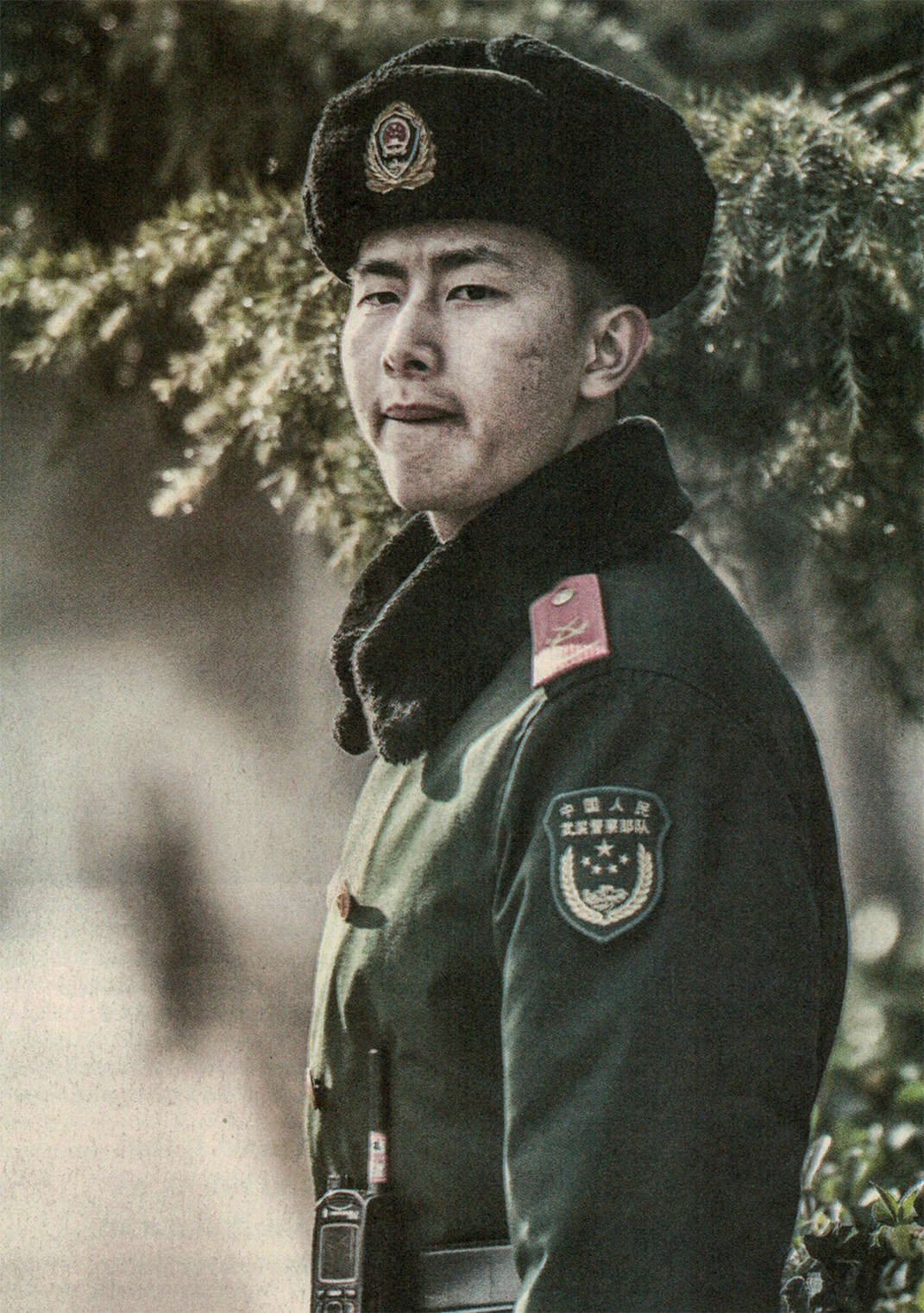
FRED DUFOUR/AFP/GETTY IMAGES

A Chinese paramilitary policeman stands guard in Beijing on Dec. 2, 2017.
China has announced that it is undertaking a massive sweep to clean out criminal gangs.
The orders came from the top. During a recent political meeting on Jan. 11, Chinese leader Xi Jinping made it clear: “We need to combine anti-corruption with sweeping out gangs and eliminating evil forces. We need to catch the gang-related organizations. and catch the protectors behind them.”
On Jan. 24, the central authorities sent out a notice declaring the effort to clean out gangs and their protectors “a major political task,” asking all local Party committees and governments to place it “at a prominent position amid one’s work.”
End of January, Chinese state media ran reports detailing how high-level officials colluded with notorious gangs, a publicity campaign to get the public behind the regime’s latest move.
Why is the regime suddenly so devoted to this cause?
For a long time. gangs have served as for hire thugs when businesses get into disputes or need to chase down someone who owes them money.
A recent example has captured Chinese media attention. On Jan. 27, the head of a hospital in Langfang City, Hebei Province, identified as Mr. Mang, jumped out from his office window and died. Soon after, a suicide note purport wily from Mr. Zhang was circulated online. It detailed how after the hospital, which was founded by Zhang, parmered with a local real estate company to run operations, the two sides entered into disputes about finances and hospital management.
Zhane wrote that in October 2017, while on his way to visit his parents, four men in masks emerged from a car and proceeded to beat him. One of his legs was broken.
On Jan. 31, local police said they discovered that the four thugs were hired by a Mr. Zhao, who was in turn instructed by Yang Yuzhong; Zhang’s business partner. Yang also happens to be a local Party representative to the National People's Congress, China’s rubber-stamp legislature.
By initiating a campaign to clean out criminal gangs, the Chinese regime is “maintaining social stability,” said Chen Kuide, a China scholar and executive director of Princeton University’s China Initiative, during an interview with Voice of America (VOA). The phrase is used to describe efforts to stamp out anything that could cause social unrest or dissent against the authorities.
Criminal gangs and their violent activities could cause public disturbance, so the regime's purported crackdown can act as a deterrence. said Chen.
Gangs and police in China often form an alliance to benefit each othen gangs bribe the police to get them off the hook, while police and corrupt officials can have gang members do their bidding.
The Chinese regime gave the prominent example of Liu Han, a big mafia boss in Sichuan Porvince who was ultimately brought down and executed by the state in February 2015. But before his downfall, he was protected by officials high and low: The Chinese Communist Party’s anti-corruption agency ran an article in its mouthpiece newspaper on Jan. 28 detailing how officials in the public security bureaus (essentially police stations) of Deyang and Shifang cities would often get treated to banquets and liquor by Liu’s gang. They, in turn, provided gang members with weapons and bullets.
The gang’s biggest protector was Zhou Yongkang, the disgraced former security czar who was sentenced to life imprisonment on bribery charges. Two other state media, Beijing Daily, and CCTV ran articles explaining Zhou’s ties with Liu.
Organizationally, it [the gang cleanup campaign] is like inspecting and drilling your troops.
Chen Kuide, executive director, China Initiative, Princeton University
In 2001, Liu first won favor with the Sichuan party secretary and Thou’s son, Zhou Bin, by buying up the tatter’s struggling tourism project for millions more than it was worth.
In return, when Liu wanted to buy up a mine in Yunnan, Zhou Yongkang made a phone call to the Yunnan party secretary on his behalf. Liu ended up buying controlling shares of the mine for one billion yuan (about $159 million).
Liu made most of his money through mining. His front company, Hanlong Group, was the largest private firm in Sichuan. When Liu wished to off his business rival, Yuan Baojing, Zhou, and his son arranged for Yuan's and his brothers' arrests. They were all sentenced to death in 2006.
The mention of Zhou, the most powerful official purged in Xi Jinping's anti-corruption campaign, also hints at the deeper political reasons for the gang cleanup.
Zhou was the head of the Central Political and Legal Affairs Committee, which at the time, controlled all aspects of law enforcement, from the police to courts. The gang cleanup implies the Xi regime wants to clear out any remaining corrupt officials who were under Zhou’s influence, according to China commentator Xia Xiaoqiang. Zhou and his circle were particularly dangerous to Xi because they were planning to stage a coup and allow the opposing faction to rule the Party.
The gang cleanup will be a test of loyalty within China’s law enforcement to see who will listen to Xi. “Organizationally, it [the gang cleanup campaign] is like inspecting and drilling your troops,” Chen Kuide said in his interview with VOA.
He also offered the theory that the central authorities may be using the campaign to shake down gangs—as many local authorities are struggling financially.
The IMF estimated that China's debt will total 2.55 times its GDP. American-based Chinese economist Dr. Cheng Xiaonong estimated that out of China’s 31 provinces and directly governed municipalities, 25 are in debt.
Wen Pu, Li Wenhui, and Fang Xiao contributed to this report.